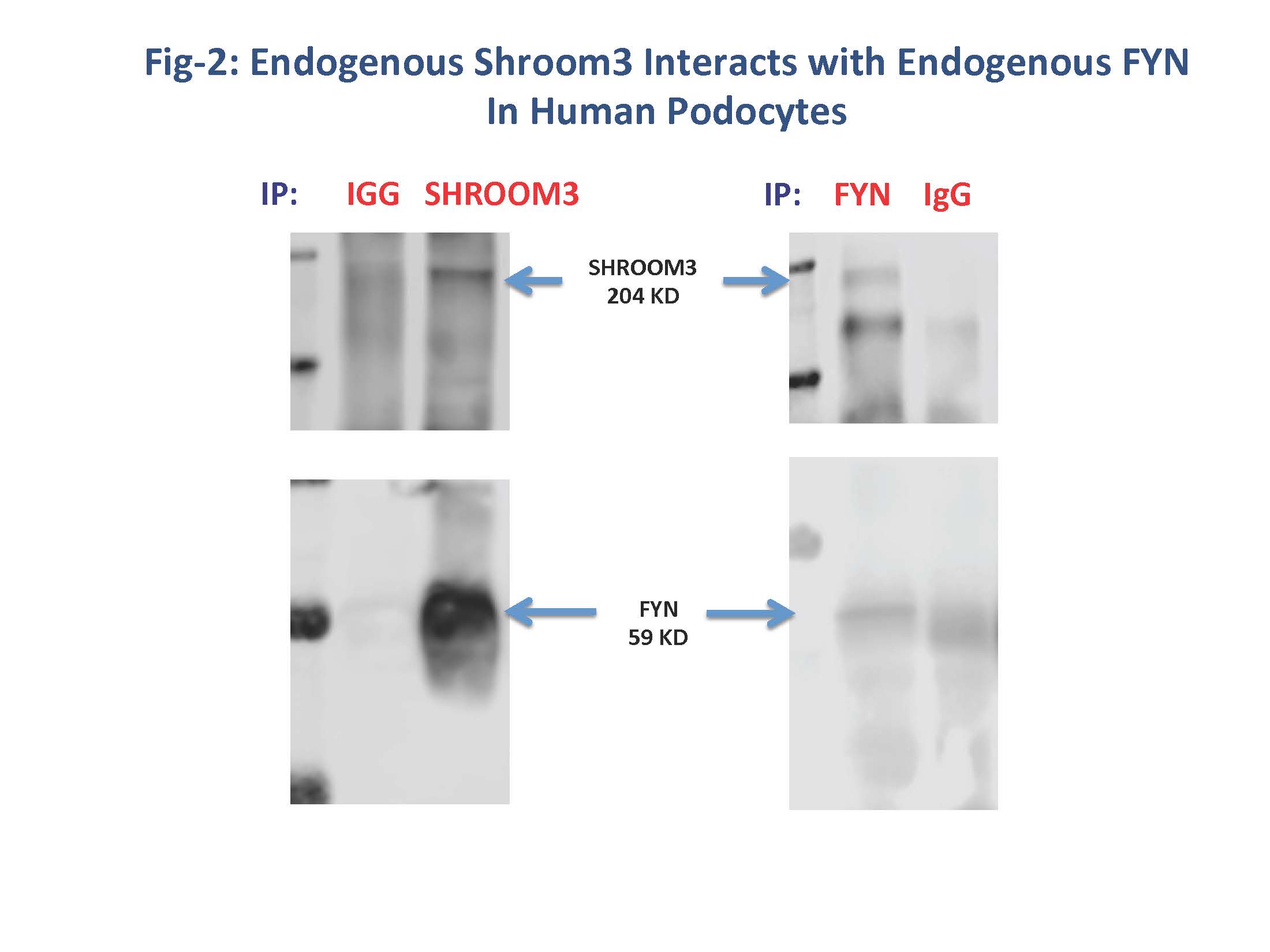Podocyte-Specific Knockdown of SHROOM3 Causes Albuminuria and Foot-Process Effacement by Interaction with FYN.
Nephrology, Medicine, Icahn School of Medicine, New York, NY
Meeting: 2017 American Transplant Congress
Abstract number: 313
Keywords: Fibrosis, Proteinuria, Protocol biopsy
Session Information
Session Name: Concurrent Session: Basic Chronic Rejection
Session Type: Concurrent Session
Date: Monday, May 1, 2017
Session Time: 4:30pm-6:00pm
 Presentation Time: 5:06pm-5:18pm
Presentation Time: 5:06pm-5:18pm
Location: E351
In the translational GoCAR study, we identified that a CKD-associated SHROOM3-SNP, and tubular SHROOM3 expression correlated with the development of renal fibrosis post-transplant. The SNP enhanced SHROOM3 expression and facilitated TGF-B signaling suggesting a potential role as a therapeutic target. However, recent data suggest a protective role for SHROOM3 in proteinuria and glomerulogenesis. To study the role of SHROOM3 in the glomerular filtration barrier of adult mice, we used doxycycline-inducible shRNA-mediated SHROOM3 knockdown mice with Podocin-RTTA promoter. After 2-wks DOX feeding, Podo-RTTA adult male mice developed significant albuminuria compared to littermates. Albuminuria reversed on DOX-withdrawal, and reappeared on re-initiation. Glomerular protein/RNA extraction confirmed Shroom3 knockdown, and reduced podocyte differentiation markers [SYNPO/PODO/NPHS1]. No podocyte loss or glomerulosclerosis was observed in these mice (8-wks DOX). Electron microscopy revealed ~50% foot process effacement compared to controls. Tubular-specific SHROOM3-knockdown did not show a proteinuria phenotype. To investigate interacting partners of SHROOM3 we performed mass spectrometry on protein lysates of 293-T cells overexpressing SHROOM3 immunoprecipitated (IP) with either anti-V5, anti-SHROOM3 or IgG control. After applying filters to remove low spectral count proteins /non-specific interactions, we identified 491 unique proteins, and confirmed SHROOM3 as the top ranking protein in this analysis. Interestingly, FYN – a member of the src-kinase family – was a top ranking candidate. FYN is crucial for NPHS1-phosphorylation, and FYN-deficient mice show identical proteinuria phenotype. In human podocytes, we confirmed the interaction of endogenous SHROOM3 and FYN by IP-experiments. Ongoing experiments are confirming the putative domain responsible for this interaction and its role in FYN-activation. In summary, we show that Podocyte-specific SHROOM3 knockdown causes a reversible proteinuria phenotype in adult mice, possibly by interacting with FYN, a mechanism distinct from its effect on renal fibrosis in allografts.
Ongoing experiments are confirming the putative domain responsible for this interaction and its role in FYN-activation. In summary, we show that Podocyte-specific SHROOM3 knockdown causes a reversible proteinuria phenotype in adult mice, possibly by interacting with FYN, a mechanism distinct from its effect on renal fibrosis in allografts.
CITATION INFORMATION: Menon M, Philippe N, Wei C, Zhang W, He J, Murphy B. Podocyte-Specific Knockdown of SHROOM3 Causes Albuminuria and Foot-Process Effacement by Interaction with FYN. Am J Transplant. 2017;17 (suppl 3).
To cite this abstract in AMA style:
Menon M, Philippe N, Wei C, Zhang W, He J, Murphy B. Podocyte-Specific Knockdown of SHROOM3 Causes Albuminuria and Foot-Process Effacement by Interaction with FYN. [abstract]. Am J Transplant. 2017; 17 (suppl 3). https://atcmeetingabstracts.com/abstract/podocyte-specific-knockdown-of-shroom3-causes-albuminuria-and-foot-process-effacement-by-interaction-with-fyn/. Accessed February 26, 2026.« Back to 2017 American Transplant Congress
